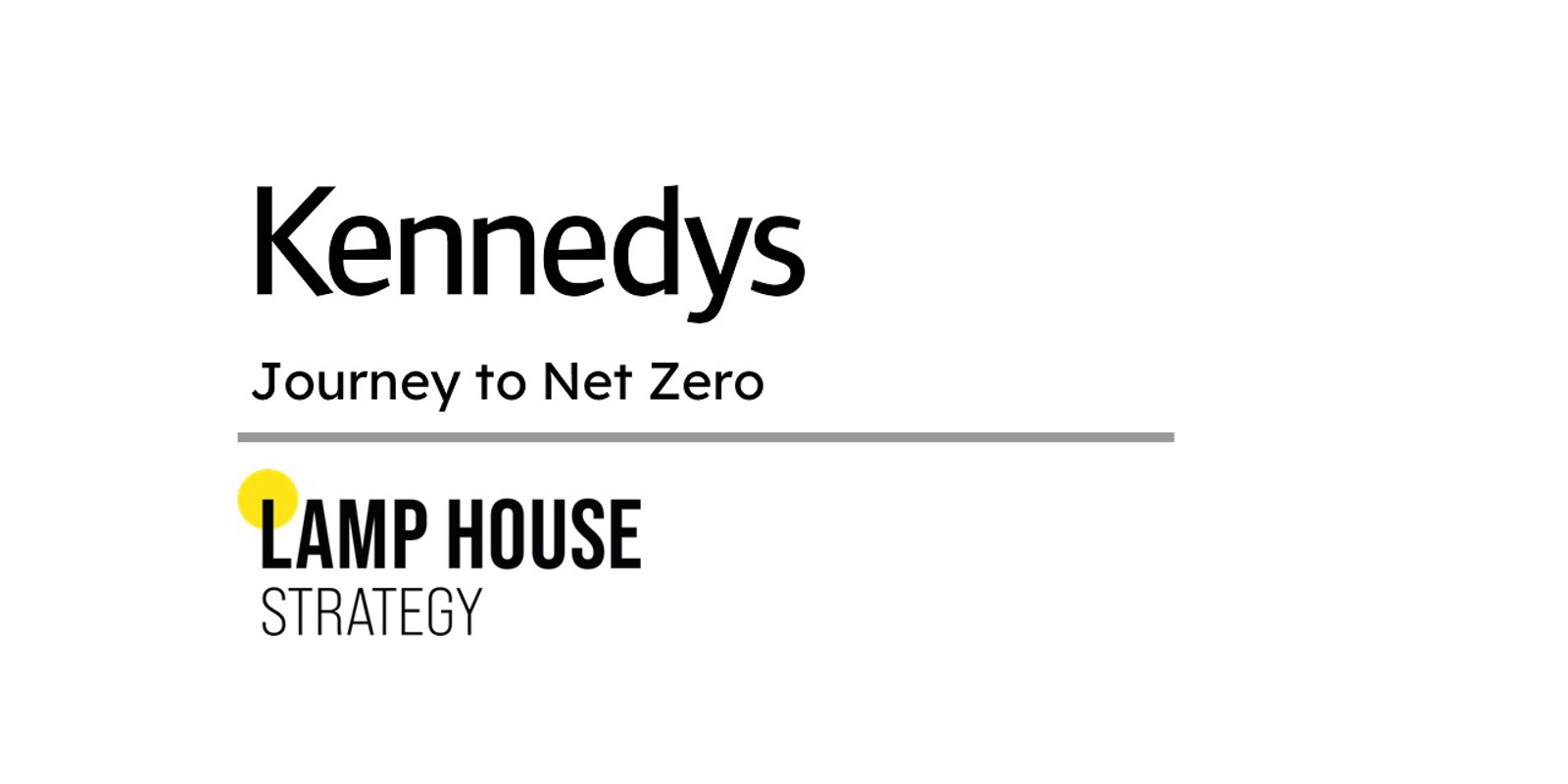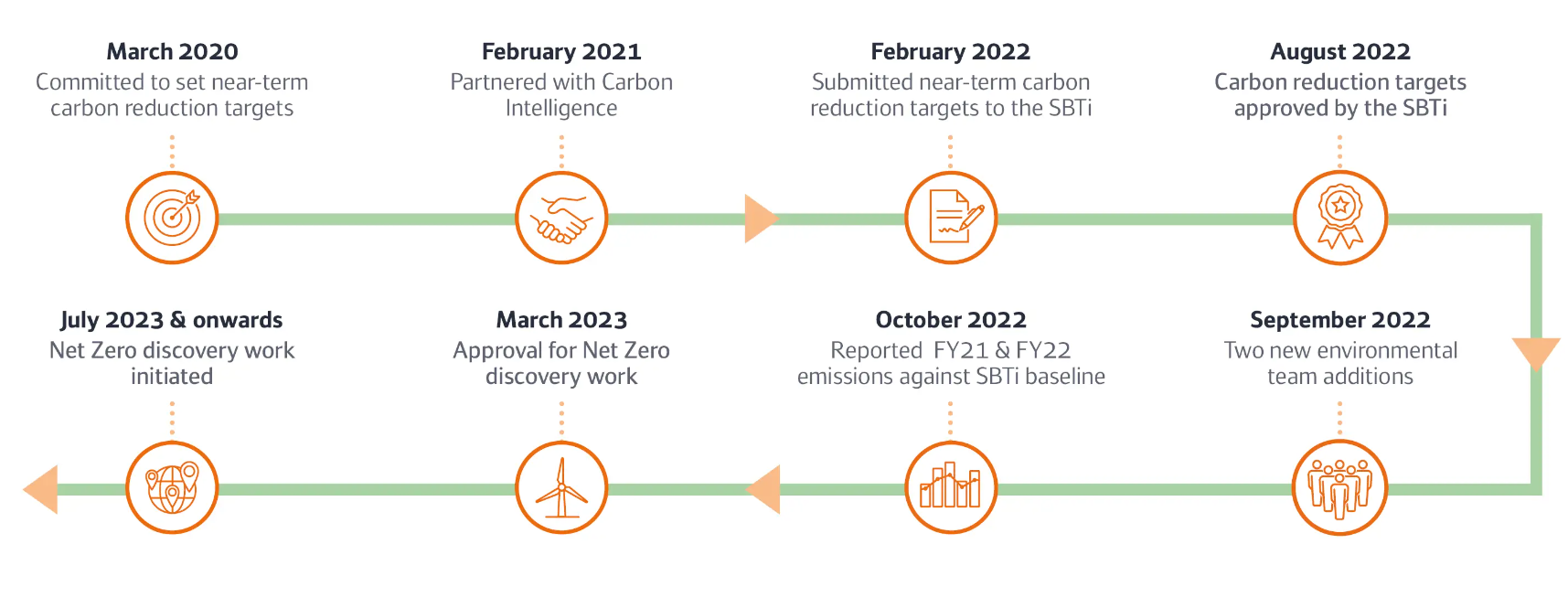Case study: Kennedys’ Journey to Net Zero

The latest case study in our series looks at how law firms are building their own carbon reduction programmes.
There is a huge amount of variance across law firms in terms of where firms are on their decarbonisation journey. Lamp House’s First Annual Report featured the stat that only 22% of firms have publicly declared a Net Zero target. The same proportion are externally reporting on their Scope 1, 2 and 3 emissions.
Kennedys is one of the firms that has openly communicated its ambitions to reduce emissions by 2030, in plans approved by the Science Based Targets Initiative (SBTi).
We spoke to Olivia Furssedonn, Sustainability & Environmental Manager at Kennedys, to understand more about how the firm has approached this issue.
Olivia Furssedonn, Sustainability & Environmental Manager
Olivia is Kennedys’ Sustainability and Environmental Manager and is responsible for measuring and managing the firm’s carbon footprint. Olivia also implements initiatives which aim to drive down the firm’s global emissions.
Before joining Kennedys, Olivia was a project manager in the compost and anaerobic digestion sectors and has also spent time providing renewable energy technology support to SMEs. After living a stone’s throw from the Canadian Rockies and experiencing first-hand the fragility of our natural world, Olivia set her sights on emissions reduction.
Overview of the programme
Kennedys as a firm has developed a wider Responsible Business Strategy, which uses five of the 17 UN Sustainable Development Goals as its guiding priorities.
In particular, the goal on climate action underpins the firm’s environmental work and guides how the firm will adapt to a changing world, including the decarbonisation of its operations.
In 2020, the firm committed to setting near-term carbon reduction targets. It also partnered with the consultancy Carbon Intelligence (now part of Accenture) who assisted the firm in establishing its baseline year (FY20) and measuring the firm’s FY20 emissions.
In February 2022, Kennedys submitted its near-term carbon reduction targets to the SBTi. This committed the firm to:
- Reducing its Scope 1 and 2 emissions by 70%
- Reducing its Scope 3 emissions by 28%, both by 2030.
In August 2022, these targets were validated and approved by the SBTi. Kennedys measures its Scope 1, 2 and 3 emissions each year to determine progress against its baseline and emission reduction commitments.

Five elements of the programme :
- Creating ownership channels: In the past year, Kennedys has onboarded a Head of Responsible Business, a Sustainable Procurement Manager and a Sustainability and Environmental Manager who are driving forward the work in this area.
As Head of Responsible Business, Kate Hursthouse is instrumental in scoping out and driving forward the firm’s Responsible Business Strategy and ensuring it’s integrated into Kennedys’ core operations. The environment, or environmental sustainability, forms a sizeable part of this strategy. Kate joined the firm in December 2022 and brings with her an impressive portfolio of responsible business experience in the legal sector.
Ross S. is Kennedys’ first Sustainable Procurement Manager. Ross plays a pivotal role in the carbon reduction journey by setting environmental expectations for new and existing suppliers. This work aims to drive down Scope 3 emissions, which is where the majority of Kennedys’ carbon emissions are derived.
Kate, Ross and Olivia work closely together as part of the wider Responsible Business Team and tackle the ‘E’ pillar of ESG.
- Identifying carbon hotspots: the firm’s external consultants have helped the firm to identify its emission hotspots and what active steps can be taken to reduce carbon output in these areas. Additionally, the firm is looking to procure its global energy from renewable means and has other waste reduction initiatives in place.
- Engaging employees: With employees and clients playing an important role in the decarbonisation journey, the firm is soon rolling out global training on the Climate Action SDG. It also hosts an annual Green Week which aims to educate and engage staff around the environmental commitments and ambitions of the firm.
- Engaging suppliers: As is the case with most law firms, the majority of Kennedys’ emissions sit in Scope 3, specifically within the PG&S (Purchased Goods & Services) and business travel categories. Consequently, the firm is also engaging with its supply chain to understand their individual footprints and to obtain their emissions data. This includes using Environmental Questionnaires which are sent to existing suppliers and which generate an Environmental Impact Score for that supplier.
- Looking at business travel: with business travel being one of the main contributors to the firm’s Scope 3 emissions, Kennedys is currently revising its business travel policy. It is also exploring several ways in which it can take more action in this space; this includes the idea of allocating a carbon budget to teams and individuals, and updating the firm’s booking platform, so that people are able to see and understand the carbon associated with a specific journey.
Key drivers for the carbon reduction journey
There are a several reasons why the carbon reduction programme is so important for Kennedys. It is partly about doing the right thing, being aware of Kennedys’ environmental impact as a global firm and a collective responsibility to adhere to The Paris Agreement. The expectations of its people, clients and suppliers are also changing; current staff and new talent want to know they are working for a responsible organisation. Clients are also asking for more specific environmental commitments, such as waste reduction strategies and Net Zero targets.
As well as this, decarbonising is a means of futureproofing. Embedding long-term sustainable practices into the firm will place Kennedys in a robust position to mitigate the impacts of climate change; for example, by shielding against the rising cost of energy and fuel prices. Reducing the environmental impact of the business will improve the sustainability of the business and increase long-term success.
Highlights from the programme
Kennedys has recently had it FY23 emissions data through, and is pleased to report that since its baseline year (FY20) the firm’s Scope 2 emissions (that is emissions derived from purchased electricity) have decreased by 46%. This is a result of an increase of real data in place of estimated data and further due to the growth of renewable energy procurement. Eleven of the firm’s worldwide offices are now powered by 100% renewable energy.
Future direction
Kennedys has only recently embarked on its Net Zero journey; it will continue to work with its consultants to determine what a realistic yet ambitious Net Zero target looks like for them. It is the firm’s intention to be a Net Zero firm by no later than 2050.
Challenges
One of the main challenges is that the majority of the firm’s emissions sit within Scope 3, primarily within PG&S.
Being a global firm, Kennedys has an extensive catalogue of suppliers. Where it does not have data or complete data for a supplier, the firm has to instead rely on spend or estimated data.
As a firm, Kennedys recognises this is not best practice and, in many cases, not a true representation of the supplier’s footprint. An ongoing challenge is moving away from spend and estimated data to actual data, so that the firm paints an accurate picture of its PG&S footprint.
To address this, the firm has established a Supplier Engagement Programme. This involves liaising with key suppliers to educate them on Kennedys’ emissions reduction commitments, to understand its suppliers’ environmental agenda, if any, and to encourage suppliers to collate their own emissions data where feasible. So far, through gathering supplier emissions data the firm has been able to reduce non-matter spend carbon exposure by 14%.
Advice
We asked Olivia what advice she would give to other law firms looking to launch, or improve, initiatives within their firm:
“You can’t manage what you can’t measure! The carbon emission data we’ve collected across Scopes 1, 2 and 3 has been invaluable because it’s given us direction. The data has highlighted our carbon hotspots and therefore where our efforts should be focused. We encourage anyone who’s starting out on a similar journey to find clarity through data collection for the most effective emissions management.”


